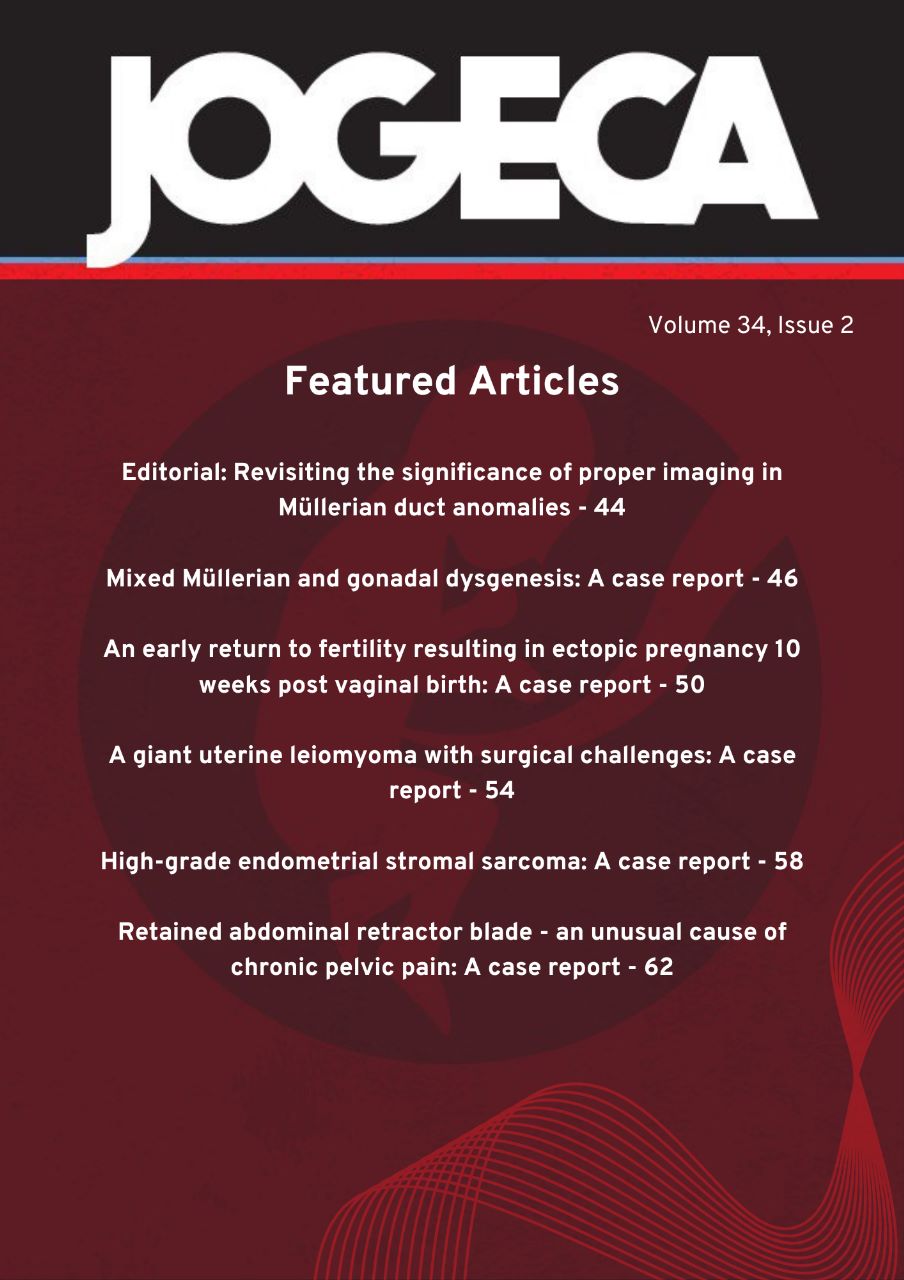Diagnosis and management of misplaced intrauterine devices: A case series
DOI:
https://doi.org/10.59692/jogeca.v37i2.480Keywords:
Intra-uterine contraceptive device, Laparoscopy, Hysteroscopy, Misplaced IUCDAbstract
Background: Intrauterine contraceptive devices (IUCDs) are widely used for long-term contraception and are generally safe. However, misplacement can occur, often presenting as a missing thread and typically remaining asymptomatic. A misplaced IUCD can lead to complications like uterine perforation, migration to adjacent organs, pelvic abscess, or ectopic pregnancy. Various diagnostic and treatment modalities are available for management.
Case series: We present 10 cases of misplaced IUCDs encountered at Kenyatta National Hospital, highlighting their clinical presentations, diagnostic approaches, and treatment strategies.
Conclusion: This case series highlights the importance of vigilant monitoring for nonspecific symptoms indicative of IUCD displacement or migration. Timely evaluation and intervention are essential, with imaging and minimally invasive surgery playing a central role in achieving favorable outcomes.
Keywords: hysteroscopy, intrauterine contraceptive device, laparoscopy, misplaced IUCD
References
Reinprayoon D. Intrauterine contraception. Curr Opin Obstet Gynecol. 1992;4(4):527-530
Arif SH, Mohammed AA. Migrated intrauterine device presented as anterior abdominal wall abscess. J Surg Case Rep. 2019;2019(6):rjz174. Published 2019 Jun 14. doi:10.1093/jscr/rjz174
Kaislasuo J, Suhonen S, Gissler M, Lähteenmäki P, Heikinheimo O. Uterine perforation caused by intrauterine devices: clinical course and treatment. Hum Reprod. 2013;28(6):1546-1551. doi:10.1093/humrep/det074
Houmaid H, Harou K, Fakhir B, et al. Migration of an intrauterine contraceptive device into the bladder complicated by stone formation an exceptional complication: case report and literature review. Contracept Reprod Med. 2024;9(1):42. Published 2024 Aug 28. doi:10.1186/s40834-024-00302-x
Akay A, Dilbaz B, Dilbaz S, Engin Üstün Y. The management of the malposition of intrauterine devices at the tertiary center. Journal of Controversies in Obstetrics & Gynecology and Pediatrics. 2023 Jul 30;1(3):62-7
Connolly CT, Fox NS. Incidence and Risk Factors for a Malpositioned Intrauterine Device Detected on Three-Dimensional Ultrasound Within Eight Weeks of Placement. J Ultrasound Med. 2022;41(6):1525-1536. doi:10.1002/jum.15836
Peri N, Graham D, Levine D. Imaging of intrauterine contraceptive devices. J Ultrasound Med. 2007;26(10):1389-1401. doi:10.7863/jum.2007.26.10.1389
Fassett MJ, Reed SD, Rothman KJ, et al. Risks of Uterine Perforation and Expulsion Associated With Intrauterine Devices. Obstet Gynecol. 2023;142(3):641-651. doi:10.1097/AOG.0000000000005299
Nceboz US, Ozçakir HT, Uyar Y, Cağlar H. Migration of an intrauterine contraceptive device to the sigmoid colon: a case report. Eur J Contracept Reprod Health Care. 2003;8(4):229-232
Randić L, Haller H. Ectopic pregnancy among past IUD users. Int J Gynaecol Obstet. 1992;38(4):299-304. doi:10.1016/0020-7292(92)91022-g
Downloads
Published
How to Cite
Issue
Section
Categories
License
Copyright (c) 2025 DR DORIS MWENDA, DR KHUSHBOO JAYANT SONIGRA, DR SYLVIA MULANDI, DR. ALEX BOSIRE, DR JAMES AMENGE

This work is licensed under a Creative Commons Attribution 4.0 International License.





